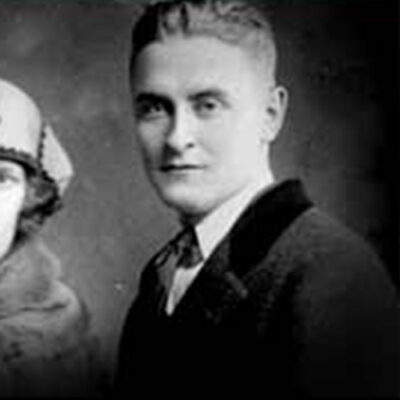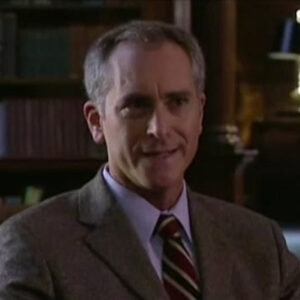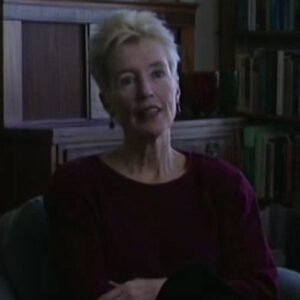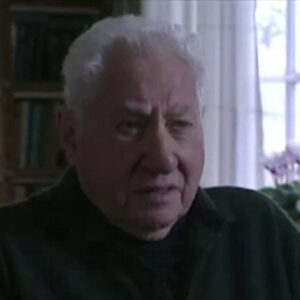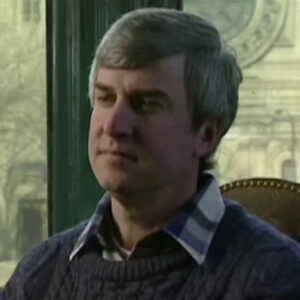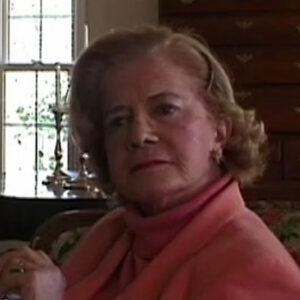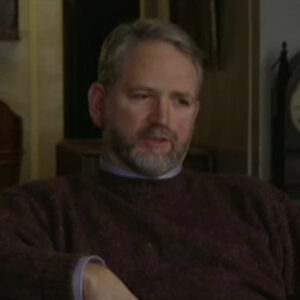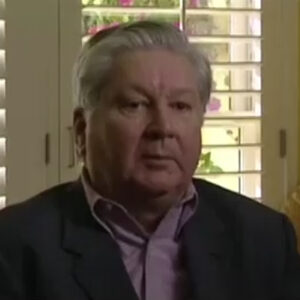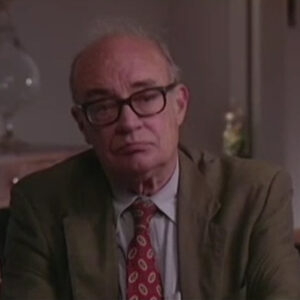Speaker I was essentially raised by my grandfather up on the 600 block of Lawrence Street, my parents were divorced and I moved into his household when I was about six years old. He had been and then the ladies ready to wear business. He had founded the first lady’s millinery business in this town would go to New York in the spring and in the fall and buy quality merchandise and sell it to the rich ladies of the community. He lost that business in 1936. And we our family was on hard times and we worked since I was greatly aware of the cast and the structure in this town, it a lot had to do with what street she lived on, what block of what street, what kind of automobile the family had, where the family might live within the political pecking order of town.
Speaker And I would say that we were highly structured community that just speaking to me and for yourself, because we’re not you you don’t have to. You can. We can just storytelling. OK, so where was your family and in your view in the pecking order, where where did you all rack stack up?
Speaker My grandfather was an elegant man, but he was a failed man. His business had failed. His wife was an invalid. We were people who were acutely aware of the pecking order, but we were definitely on the outside looking in. He had a 1929 Chrysler Silverdome car and a nice Victorian house, and that was all. His job was at the courthouse and it was a political job that had been given to him by his best friend. I was very aware of of the structure in this town and very aware of my place in it, which was where which was we were at it at the bottom of the pecking order or pretty close to the bottom of the pecking order.
Speaker And you told me when I first met you, I thought this was one year and that. Too, too poor to pay, too proud to whitewash it. What does that mean?
Speaker That’s about right. You know, my grandfather divided his house up into into two parts and rented a part of it out. I mean, we would we would need income. I would ask him on Sunday afternoon to take me to Moore Creek, which was a wonderful place near here, and he’d say, son, it’d be another trip on a car and it’ll take two gallons of gas. And, you know, gas was about 11 cents a gallon then. But it was tough. It was very tough. I mean, I was there because my mother was divorced and she was working elsewhere and she couldn’t keep my brother and me. He was the older boy. She kept him. I was there. The family was split up. It was tough.
Speaker And as the fresh thought, I knew who was. This is my mistake. Who was doing haberdashery in effect for the shirts and Hayama?
Speaker That was me later. Later when I was going to Huntingdon College and I was 18 years old. I’ve been working since I was 14 and and I had an afternoon job in a very nice haberdashery downtown selling shirts and ties. And that was when I read Gatsby and I was selling shirts and ties and and I read Gatsby and I saw this guy who had a room full of new shirts and ties and and I’d been working since I was 14. And this said there’s a better way. That was my message when I read the message. It came to me when I read Gatsby was I read about that bond salesman and I said, I don’t want to sell shirts and ties. I want to enjoy shirts and ties. And I want to be a bond salesman because it’s easy money. And you you’re associated with elegant upper class people.
Speaker And what was your reaction? Why were you why did you weep? Gasping Where did this come into your life? And did you have any feeling of knowledge or awareness that this was a there was a real local angle?
Speaker Oh, you know, I had met Zelda when I was probably. 10 or 11, my aunt was in Zella’s high school class and she introduced me to Zelda, I knew who Zelda was long before then. I knew that that Zelda and Scott Fitzgerald were very important American people. And so it was a big deal. When I met Zelda 10, 11, she was, of course, a woman who was very sick at that time. She was here in Montgomery on a short visit. But the Fitzgerald story was something we lived with around this town, at least we did in my family and in so when I was when I was 18 and going to Huntington College. I was pretty messed up guy, really, and had this fabulous professor named Floyd Gillis who taught me principles, economics, and he knew I was working in the afternoon and he knew I was scrambling. But he also knew I wasn’t doing a very good job in school. And he said, you know, to me one day, Mr. Fraser, you’re not nearly as smart as you think you are and you really need to get going. And we became friends and he counseled me and advised me he knew what kind of grade I was making in English. And he he told me to read Gatsby. And I was already babysitting at night and working an afternoon and and about to flunk out of school. So the last thing I needed to do was to read a novel that wasn’t for credit, but I did. I read The Great Gatsby. And that was became a vision for me. And I was years later, I was with Scott Scott Fitzgerald and and I said she said, what do you do for a living? And I said, I’m a security salesman. And she said, How interesting. And I said, it’s especially interesting that I’m a security salesman. I became a bond salesman because of reading your father’s novel. That was a signal event in my life.
Speaker You’re at college, you’re working many jobs, and you’re kind of messing up what what is the messing up man? I mean, you got yourself in some trouble. And what did Floyd, I want to kind of wrap these together, if we can. My impression was he wanted you to take out of this more a career in literature than maybe running off to New York.
Speaker But I’m not sure that I think that’s the way you told it. I mean, can you help me on that? As a freshman? Floyd Gillis was wonderful to me.
Speaker And he married that year and he had a young wife and and he would invite me to his house for coffee. And I would go by and say, I can only stay 20 minutes because time was so precious.
Speaker But he he told me to read Gatsby and he he said there are many, many people in this town who are very familiar with the Fitzgerald literature and with Zelda Sayre. And he said, you should think about an English major and you can go to Auburn. And they have a very good English department at Auburn and you could get a scholarship to do a master’s there.
Speaker Of course, I was only a freshman at that point, but he was he was pointing me toward a more intellectual life. I think he also pointed my brother, who later took a Ph.D. in economics from Columbia University. He appointed him to be a professor. I thought everybody should be a professor. So he he wanted me to become an English teacher. And later years, he dramatically influenced me in other ways.
Speaker I came I dropped out of college, went into the army for three years during the Korean War, came back and I visited him.
Speaker And in Boston, he was taking a Ph.D. in economics at Harvard. And he said, you he walked me across the Morra’s Anderson Bridge and he said to the Harvard Business School and he said, this is where you should go.
Speaker So that man. He didn’t know it when he introduced me to Gadsby.
Speaker He introduced me to the notion of being a bond salesman, I had that idea when I was 18 and I’d probably never heard of Harvard Business School, and he took me and said, this is where you should go.
Speaker And remember this kitchen timer, and I just want to try one more time, right, right on that seems all right that you knew you were supposed to Gadsby and there was a literary message and a local history. You knew about that. But the message you took, as you told me in the past, was not so much a literary message. It was OK. There was a path. There was a delivery.
Speaker Absolutely floored.
Speaker Get can can we start again and define your terms now? I don’t know who Floyd is and just condensed.
Speaker Floyd Gillis was my economic professor at Huntington College and he was counseling me because I was. A marginal student, he thought I had some ability. To appreciate the English language, and he thought I should become an English teacher, and he Playgirls introduced me to The Gatsby, he said read Gatsby and he was trying to make me get on the path of becoming an English professor.
Speaker He suggested that Auburn had a really good graduate school in English and that I might be able to get scholarship there if I could clean my act up and that there was so much Rich Fitzgerald law in Montgomery, so many people at that time were alive who knew Scott and Zelda, and the message just didn’t wash with me that way. Instead, I got out of the book, I want to be a bond salesman. This is a better way out of out of this hard time I’ve been in. And I wanted to make the money. I wanted to get to New York. I wanted the glamour. I wanted the I wanted to be associated with these these quality people. And and that was what Gatsby led me to.
Speaker And ironically, Floyd, who tried to make me into an English teacher a few years later, took me across the Lars Anderson Bridge from Cambridge to Harvard Business School and said, when you finish college, this is where you should come. So he then saw me going into into business and he referred to it as a big trade school. He he of course, it was not a step down for me, but he would have preferred seeing me become an English teacher. And instead, he then launched me into a finance career. I took finance at the Harvard Business School.
Speaker And and and it it changed my life.
Speaker How was Zelda Sayre, Zelda Sayre was kind of a hero to A-Rod. She was kind of a model now a role model, as I recall you telling me.
Speaker Can you help me with that as a fresh thought in your family, if this was their special status for this, especially this woman?
Speaker Defining our terms again, Zelda Sayre and my Aunt Ellen were at Lanier High School in the same class. My Aunt Ellen was a beautiful woman who sang, and she was. Probably more cultured and refined than my mother, my mother was a little bit younger and my mother is the one who absolutely idolized Zelda and my mother became a latter day flapper. And anything that Zelda did, my mother thought was wonderful. I mean, my mother was an early smoker because Zelda would smoke.
Speaker And and that was the.
Speaker That was the spirit that I grew up with, that that Zellar was a woman who was quite something and we knew who the sailors were, the sailors lived about six, eight blocks from where my grandfather lived. I knew the judge just say I was an austere man and and on the Supreme Court and that that Zelda created a lot of family problems because she was violating all the local rules and the structured the structured class type thing. If you were Judge Sassed daughter, you were supposed to act in a certain way and Zelda didn’t act that way. And my mother was, you know, and it linnear she was in plays and in my aunt sang and and so that Zelda was a role model for for my mother and my and one of my aunts in particular, who were my mother and my aunt were very influential with me. My sense is that Inceptions Fruit and Zeller’s Zello was deemed to be wild as a March hare. She was she she was a fast girl. She had many bows. She was penned many times. One of one of my family’s great friends was a most attractive man named Charlie Abercrombie, Charlie Abercrombie. And my mother and I discussed this. This is not hearsay. I was there in Charlie was a dick at the University of Alabama and he had been courting Zelda. And Zelda had his fraternity pin. She probably had four or five other fraternity pins at the same time. And Charlie said, and I’ve never doubted this, that he had a telegram from Zelda that said, Charlie, if you do not come to see me this weekend, I am going to marry Scott Fitzgerald. And that was the way she was deemed to be.
Speaker How to judge Sayer again at the finding of he is what his legal status was in town. How do you deal with this, this unusual daughter?
Speaker Well, I never knew Judge Sayer, but I can imagine that it must have been very painful for him. My grandfather had three daughters and my grandfather was a pretty straitlaced guy.
Speaker And it was very painful for him when they would kind of do anything that wasn’t within the between the ditches in this community life here. And this this community has always been. Quick. To define what one should or should not do, I think it was a hard stretch for judge to say to have to have Zelma.
Speaker But she must have been proud of it, too, because she was such a leader. I mean, she just was everybody looked up to her. I’m not sure I’m not sure that the mothers of the town looked up to it. But the the young the young girls are her peers looked up to her.
Speaker Now, help me out with a context where suddenly World War One is coming around and all these Yankee soldiers and sometimes I don’t know I don’t really know the history very well, why was there suddenly an infusion of soldiers from all over the country down here and. What was the what’s your sense, at least of the local communities response of these there, all these guys? Well, I around say I don’t know everybody, of course, but I think that it was the prize.
Speaker Alabama played a very important role in World War One before we went into World War One. The Alabama 167 Infantry Regiment of the Alabama National Guard was mobilized and went to the Mexican border, ostensibly to chase Pancho Villa. It was the Louisiana maneuvers of World War One. You may recall how we had Louisiana maneuvers at World War Two.
Speaker General Pershing was there on the on the Mexican border.
Speaker We sent 3000 men, more than 3000 men from the Alabama National Guard down to the Mexican border. They came back, were instantly mobilized when World War One started and went to France. And Bill screw’s was the regimental commander. Douglas MacArthur was a brigade commander. It was a very celebrated combat unit, one of the first combat units in.
Speaker They left our Union Station with 3500 men. They had 664 killed and a couple of thousand wounded. My father was wounded.
Speaker That I say all this because when the Ohio soldiers were mobilized and brought down here to train, we had already sent a regiment to France that was in the trenches at Chateau Terry, San Mihail, all these great places, the bell, our wood. And when Fitzgerald came to Montgomery as a young officer, it was a romanticized time in this community. I mean, Alabama was deep into it and and the people were incredibly respectful of the military, of those who had gone and if those who were to go.
Speaker So when Scott Fitzgerald came to Montgomery, he he he he was an attractive young officer.
Speaker He met Zelon at a Saturday night party at the Montgomery Country Club.
Speaker He could not have come to a more appreciative community and, you know, I guess that he always regretted he never was in combat.
Speaker Obviously, any man who’s ever been shot at wouldn’t say that, but this town had a special appreciation for the military then. It still does. I mean, we we still do appreciate the military. And but Scott came here to a fertile seedbed. This town was prepared to have him take it by storm.
Speaker I know this is conjecture, but I really don’t know this. We’ll talk later about the Montgomery says about Zelda and Elvis. But would there have been a feeling later that year, the belle of the ball and here’s this Yankee, but maybe not a Yankee because he’s a soldier and maybe because of what you just said and with from the family, might there have been resentment? He was this guy was really and I don’t know this and you’re not required to know it, but what’s your sense?
Speaker It was a complicated thing. Many Confederate soldiers were still alive. The South was living on this faded glory. We Southerners were poor. We didn’t have anything but our our genealogy to fall back on in our glorious record from the civil war. That was all we had to fall back on. So and we had sent a regiment of southerners to France who were getting shot at. So here comes several thousand more people from the Midwest. They talk different, they walk different, and they’re here, I’m sure the judge said, looked askance at the notion of his daughter being courted by some guy from St. Paul. I’m sure he didn’t like the idea tall.
Speaker He would have been probably an unreconstructed Confederate in his political views. But the girl who’s going to control the girls, they see this guy who’s glamorous, who’s who’s an established writer, who’s attended Princeton. They probably never had known anybody that had gone to an Ivy League school at that point, a very few. And so that he comes to town and sweeps these girls off their feet. And Charlie Abercrombie despised Scott Fitzgerald. He was intensely jealous of him. He told me that himself. And I’m sure Judge Sand didn’t like it. But these women saw a different picture.
Speaker I have the impression that there was a problem. Scott fell in love with Sell-by, wanted to marry her, but she said no or said yes and then said no. I’m not even sure what the chronology is because he really wasn’t an established writer. He thought he was going to be an established writer.
Speaker And I had the feeling this guy was under some pressure. What do you know about that? Oh, is a fresh guy.
Speaker When Scott Fitzgerald was here during World War One, he could talk the talk, but he hadn’t walked the walk. He was no soldier. He was no writer. He was no Ivy League scholar. But who’s to question his this guy wearing a uniform?
Speaker He’s in this town. He’s he’s been to Princeton. He has written something and he’s wanted to go to war suddenly, if you want to.
Speaker Pick his career to pieces. He was not an established anything, but he was probably a pretty good showman and he was probably a pretty good talker.
Speaker And good talking as a Southern tradition. Oh, yeah, we are big talkers and we appreciate big talkers.
Speaker But he had to go back and get a novel under way or do you not? My sense is that either the Sayer family or Zelda wanted some assurance that this was not. I think it was probably I think it was Zelda. From what I’ve been told, some assurance that this wasn’t completely mad that this guy could help her.
Speaker Go to not only the bright lights, but maybe survive there, or is that just beyond your.
Speaker I just I just don’t know. What I was told as a child is that Zelda followed him to New York and that that was where Zelda should be. I mean, Zelda was a citizen of the world. She was bigger and faster than this country town.
Speaker Now back to Rod Frazier, you two had you read this novel and New York, I think you told me it was a glittering prize, the idea of first step. Can you help me out? What was your response again? Is that we hadn’t done a reading Great Gatsby. And what first step did you take in the right direction?
Speaker I read Gatsby. I saw that green light across the sound. I saw those shirts and ties. I saw this guy who was making a good living easy. I had done physical work. I was working long hours. I was babysitting at night. I was very interested in an easy job that had a little money and a little opportunity with it.
Speaker So I was I would I bought in quickly and and then I had the wonderful influence of this great professor at Huntington College who said, you’re not so smart, you better shape up or you’re not going to go anywhere. And I started working like a dog, quickly started making grades, started performing and and became an excellent student. And it was just that that those two influences one is I want I saw from Gatsby, this guy is showing me a way to have a better life. And then I had a professor who says, you’re not going to get that better life if you don’t work for.
Speaker We have footage of. Big question.
Speaker Jay Gatsby, as you know, is not necessarily supposed to be our role model. I mean, the guy, the guy, the guy had some problems, but he had a lot of ambition. And in my judgment, he was kind of the hero of that novel. But did you then or did you have you since thought is this quite the role model I should have followed or should I have been more respectfully involved in kind of the ambiguities of power and success that the novel represents?
Speaker Gatsby was an opportunist who had a shady past, not shady. Nobody knew what his past was. He claimed to have been in the military.
Speaker My father was a veteran. We romanticize that I liked Gatsby. I liked what he claimed he had done. And I liked the lack of orthodoxy with Gatsby.
Speaker He was not he was not confined by these constraints that we had in this community in Montgomery.
Speaker He was a guy who was ambitious. He had big parties. He had beautiful women. He had fashionable, powerful friends. I liked that. And. When you’re when you’re at the bottom of the stack, it’s you grasp at any opportunity that it presents itself to pull yourself up. I felt a gasp. You had pulled himself up. I felt I could pull myself up and I did.
Speaker And what’s your title now and what does it mean in a pricey we can’t go into the whole history of the company.
Speaker I’m the chairman and chief executive officer of the inStar Group, which is a publicly held financial holding company that does that does business globally.
Speaker And are you? Where are you that?
Speaker Total control of this company. Oh, absolutely, absolutely not the total control, but I have been the chairman of it for ten years. And it’s it’s it’s been successful under my leadership. And it’s very successful now with thanks to the enormous help of others. And in a lot of good breaks, I deem that I’ve had a successful career in the finance world. I was the co-founder of an investment banking firm that had the biggest piece of market share in public finance in this state for many, many years. I mean, and I worked very hard. Another guy and I started that investment banking firm in 1944. I left that to become the crisis chairman of of the inStar Group. I’ve made my living out of finance. I’ve always I’ve always been in the sphere of of the New York markets. I’ve always been in New York a lot. I went to Columbia for a short while. I mean, I’m very much at home in New York. I liked it. And it was to me, it was as advertised. It was as Fitz-Gerald advertised it. I liked that and I still do.
Speaker Did you feel like Fitzgerald and like Zelda, the need to get the hell out of Montgomery? I mean, Fitzgerald had the need to get out of St. Paul to get to New York. But did you also not only want to get to the big city, but get out of the small town?
Speaker When I read Gatsby, I didn’t know that I did. But then later, I know that’s exactly what I was striving for. And Gillis knew it. Gillis Gillis knew I had to get out of here, that Gillis knew there was not the opportunity for me in this town. And that was why he appointed me to Harvard Business School. And and my brother had earlier appointed me to to Columbia. So I made those steps and I got very much into the Ivy League education, the rigor of it, the competitiveness of it and the excitement of it and the opportunity of it.
Speaker Jay Gatsby not to carry this too far, but got creamed in the novel. And I think this was Scott’s view by the old money. In other words, he couldn’t at the end of the day, the Tom Buchanan creamed him. Not in terms of making money, but in terms of survival, did you ever have. How’s your feeling been here or in life? About. The social pecking order of sort of the old money versus someone who’s really earned it themselves.
Speaker Any feeling about the social pecking order has always been sorry, can we just start that again?
Speaker The social pecking order has always been important in this town. It’s changed a lot, but it still exists to some extent.
Speaker However, it has never been a.
Speaker An avenue for business success, and I never cared about the social pecking order, I have been a business opportunist, you might say. I’ve taken advantage of every business opportunity that I had, and that’s got nothing to do with the social pecking order. So it has made me a little bit different. It’s made me a little a little more aggressive, maybe a little less concerned about what people might think about what I’m doing. I don’t care what people think about it, about me or what I’m doing, as long as I’m as I myself believe that I’m doing the right thing and we’re making progress.
Speaker But you state your home base, I think, for all these years was all the attraction of foreign places and I’m using New York as the American center. I think you’ve always come back. This has always been the home base.
Speaker I made a very positive decision when I finished the Harvard Business School to return to Montgomery. I had interviewed with Goldman Sachs. I had interviewed with the first national city Bank of New York, the predecessor to the Citicorp. I had a job. I had an offer from from one. And I think I could have gotten a job with the other.
Speaker And my business, your Kleenex in New York when you’re 50, cause I didn’t know that at the time I was interviewing and considering going up there, I came back here because I guess I thought it would more opportunity. Booker T. Washington has said, put down your bucket where you are.
Speaker My mother believed in that concept. She said, if you’re going to be a writer, write about what you know. She knew that I was I was OK in this culture here. She she trusted my ability to function here. And I’m not sure that she thought I could make it in New York. I look back, I didn’t have the training opportunities here. Once I got started in the finance business, these young people going into the industry up there to learn so much more, so much quicker then than I learned it here with me. It was a school of hard knocks. You do it by the rule of do and and and now I look back and I know that that all of my peers are out of the industry, that most of them were thrown away when by the time they were 55. And I’m much older and my career has picked up speed as I’ve gone along. And also I’ve enjoyed my work more than than I ever have. I mean, I have become happier with my work every year. And I believe that being here in the South has got a lot to do with it. The South appreciates leadership and quality production, and that’s what I’ve always committed myself to.
Speaker Travel and travel that you did recent travel I was in I was in England twice last year. I was in Paris twice. I was in Berlin. I was in Asia. I’m going to go to England week after next. We bought two companies, one in Brussels, one in Bermuda. It’s a global economy. I’m associated now. I have to say this. I’m associated with the best people I’ve ever worked with in my life. I mean, my my my biggest shareholder is a brilliant young man who is very rich. And and and we I’m working with the smartest people I’ve ever worked with, the ablest people I’ve ever worked with. And they are all in New York. We run the company from here. But so much of this global leadership is coming from New York. And and, you know, I’m at the place where I count my blessings every day.
Speaker I think I could argue that you’ve done better than Kaspi.
Speaker I mean, he didn’t make it.
Speaker Well, I haven’t made it either. It’s not over till it’s over, you know, you can never say I’ve arrived, but I had a slow, hard pull for a long time. And and.
Speaker I won’t say that I made it, but I have I’ve had a I’ve seen a lot of paychecks and and I’ve enjoyed my work and I’ve enjoyed my sausage.
Speaker And I’m now associated with the smartest, best people in the world. And I envy this young generation. I am absolutely green with envy of these young, hardworking people. And in my advice to others, to other young people, is about what Gillis told me. If you’re going to try to be somebody, you’ve got to get going in school. I never could have I never could have done what I’ve done.
Speaker If if Gillis and Gatsby hadn’t pointed me to the East, to to Harvard Business School and to the grades and rigorous performance with with with competitive people.
Speaker When Zellick came back to Montgomery. If you could mention probably a time and place of her illness. Was there any resentment? This is exactly the point you were making earlier to me, but it’s a fresh thought. Did the community resent. Either Selda or Scott for what had happened to say her family resent the fact that she’d gone off and maybe maybe flown too high, too close to the sun. How did that work?
Speaker The tradition here has always been that the judge, Seyah, and the sailors resented Fitzgerald and maybe destroyed Zella’s life. That has been the tradition. The community has not felt that way. This community has always been very proud of Zelda Sayre and and has always been very protective of her.
Speaker And I know when I was 10, 11 years old and met her and she was a broken woman, she was spoken.
Speaker By my aunt was enormous, respect it, she was never a failed person when her health broke, that she was not regarded as a frail person in this community, nor did this community. Eva. Hold her broken held against Scott Fitzgerald, and that’s a departure from tradition. This is a town where the men always get blamed for the family problems. If there’s a breakup of a marriage, if there’s a breakdown of a business, if there’s a breach of family relationships, it’s always the man who gets blamed. And it would you would have expected that the community would have turned against Scott Fitzgerald for maybe destroying Zelda. It did not. All of my life here in this town, Zelda has been loved and appreciated and Scott Fitzgerald has been deeply respected.
Speaker Why did he get off the hook? I mean, why was he the exception to this? To what you’re describing is the kind of Montgomery Rule and you were sensitive to that.
Speaker Yes.
Speaker Fitzgerald probably got off the hook because of. What I’ll call a George Wallace syndrome, George Wallace used to say we’re just as cultured and refined as anybody, that was a big line in his national speechmaking. We are a little bit paranoid. You know, we are a poor state. We are a third world state.
Speaker Maybe a.
Speaker Not many of our people are too well educated. I think we probably up to the place where 20 percent of our people have college degrees. We’re way behind.
Speaker And and I think we grasped at Fitzgerald is is kind of he’s one of us. He’s one of our better people. Certainly we looked at Zelda that way. Zelda danced, she painted, she wrote maybe not the best in the world, but she was she was ambitious and she was cultured and she was refined.
Speaker And I whenever we’ve had anybody in this community who’s been upwardly mobile like that, we’ve loved them. We loved Sarah Hart, who married H.L. Mencken. We you know, we love our arts community today. We love red blood for giving us 23 million dollars to build the Alabama Shakespeare Theater. Sure. So I think I think that’s why Scott got off the hook. We took him as one of our own and we made ourselves proud of it.
Speaker It’s strange because Scott was never taken in.
Speaker By maybe any other community, he’s an expat of St. Paul, he doesn’t quite fit into New York, for instance, and doesn’t claim that it’s this may be the only place where Scott might have a home.
Speaker I wasn’t here in World War One when Scott was here, and I wasn’t here later when Zell got out of the hospital and they lived up here on Fifth Avenue for a while. I was not here. And I don’t know how their social life was. I know Easy and Jane Berman loved them and had drinks with them and admired them. But Scott was trying to write for money at that time. He probably didn’t have much of a social life and probably didn’t care very much what the community thought about him. But I do know what I was taught when I was seven, eight, nine, 10 and 11 years old when I was 18. I was always taught that these people may be the best we ever produced in the world of literature.
Speaker Did you go on reading Fitz-Gerald?
Speaker I haven’t read Gatsby in a long time, I have reread Gatsby and I have reread Fitzgerald from time to time. I went off on a Faulkner binge for a while. I read everything he had. No I’m no Fitzgerald expert. Certainly not. I was so pleased when our local college had several seminars here on on Fitzgerald. And then my wife and I were supportive of that. And we did bring in some national Fitzgerald scholars here. But I’m not a Fitzgerald expert and I really haven’t read everything he’s written, but neither have I.
Speaker But you’ve got the the EPICENTRAL lesson of your life came from a novel. I know we’ve done this, but isn’t that I mean, how much do you have to. If you if you could hit that fast with an author and get a life lesson, I think if I’d read if I’d been living.
Speaker In Missouri, when I was 18 and read The Great Gatsby, the same message would have come through, but it came home magnified in Montgomery, Alabama, because I had this I lived had been raised with this Fitzgerald and Zelda Sayre lower.
Speaker When Zelda came back here, what did she want? In other words, she was I’m not when I say that I’m talking about after Scott’s death, she really started coming back here more and more. Do you think she felt safe here? Do you think she felt this was her home base that would accept her?
Speaker When I saw her one afternoon, my mind introduced me.
Speaker I’m sorry. I just want to do that again.
Speaker When I saw Zelda, when I saw Zelda in nineteen forty three, my aunt, who had been a high school classmate, saw her on the street. Zelda was walking in front of Lanier High School and I was with my aunt. My aunt jumped out of the car and said to me, Come, I want you to meet Zelda Sayre. And in and I went and she introduced me to Zelda Zelda head on starting girl walkers. And she had on good looking English Tweed’s. She had one of those kind of 20s looking tweed hats. She was a she was a weird looking person. I mean, she was a sick woman at that time. She she did not converse. I think Zelda was a very sick person and probably did what any sick person would do. They’d go where they love most and where they are most familiar for for comfort and peace. I don’t know that. But that would be my speculation.
Speaker Scotty. Why did Scott why do you think Scotty came back after her ruthless life?
Speaker I think probably a ruthless life. What’s your surmise about that?
Speaker Well, I mean, Scott Scott is Scott Atlanteans.
Speaker Scott Lanahan Smith’s return to Montgomery probably started when the triangle on the corner of Park Avenue and Felder was dedicated as Fitzgerald Park as Fitzgerald Park Malaby. Howard was ahead of the State Department of Archives and History and and he knew Scotty and and he encouraged Scotty to come back to Montgomery for this dedication. We had a band at the local Air Force base. They turned out one beautiful Saturday morning. It was a splendid day, the city had built a little fountain up there and and Scott came to Montgomery. I don’t know when she’d been here before. I don’t think Scott, who came to Montgomery until Marlow got her to come and there was a reception and a luncheon for her that day and and everybody just loved it.
Speaker I mean, everybody was so pleased that Scott had come. She was a celebrated person. She was an intelligent literary woman. She’d come off a tough divorce. She was living in Washington. She was probably fed up with Washington. And in New York, she’d probably burn out with it. And and a few months later, as I recall, it wasn’t long. She she came to Montgomery and bought a house and and set up residence here and made many friends and was greatly loved. And I am sure that Scottie always felt that her mother and father were deeply respected here in this town.
Speaker What’s your sense of Montgomery right now, Montgomery, Alabama.
Speaker Where’s it headed, in your view? I mean, you’re deeply involved in this city. I’ve come in as a complete outsider and been very impressed by the human landscape. I’m not too sure about what I think about everything else because I don’t know what’s what’s going to happen here.
Speaker Montgomery, Alabama, is much more.
Speaker Then a half black, half white community with racial problems.
Speaker Montgomery, Alabama, is.
Speaker Is what Wallace said is cultured and refined. Is anybody Anytown would be.
Speaker The arts community.
Speaker Sells more hotel rooms than any other facet of our community does the convention and Vista Development Program of our city benefits more from the Alabama Shakespeare Festival and from arts related vistas than from any other segment? We also very, very proud of our history. We are the cradle of the Confederacy. The Civil War was launched with a Confederate Cabinet meeting that took place in downtown Montgomery when a decision was made to bombard Fort Sumter. It also is the is the foundation of the civil rights movement. Dr. King was here. The Rosa Parks was here. The bus boycott was here in the late 50s. So we’re pushing we’re very much pushing our history as the birthplace of civil war and is the birthplace of civil rights. We we think our community should become a destination for every black family in America to send its to bring its teenage children to to let them learn about the civil rights martyrs. Let them learn about the political struggles that took place here. And if people are willing to talk about it openly and frankly with all of the all of the issues. But we have you know, we are a town that is half black, but only five percent of our Chamber of Commerce membership is black. We we have got a lot of work to do to take this African-American business community and push it ahead. It was it was kept it was kept behind by tradition and law for so long that we have a very, very challenged situation, challenging situation to develop that.
Speaker Well said I had one last question. Given all that you’ve just said.
Speaker Would Scott Fitzgerald, Zelda Sayre and Jay Gatsby and Rod Frazier all still want to get the hell out of here to get to the larger lights?
Speaker Yes, you know, you want to get out.
Speaker You’d want to get the best possible education, you want to become as well acquainted with the world as you can become. You want to get the. Sharpest, most competitive business experience you can get and then maybe you’d want to come back later, but there’s certainly there’s more business done in New York before coffee break time than we do around here in a year.
Speaker What was capturing what was what Scott said it we’ve done the longer context, right, a camp Sheridan was was established in a flash when.
Speaker It World War Two started well, everyone started to loom. Let’s do that again. Yeah, you’re doing great, right? All right. When World War One started to loom.
Speaker The National Guard was small, but the Alabama unit was mobilized and it was brought to Montgomery and that was the beginning of Camp Sheridan, they just pitched a bunch of tents out there and connected it to the city water and city sewer. And then they went from here. That unit, the Alabama regiment, went to the Mexican border, came back. And then when they went to France, then the Ohio soldiers were brought in. There was a unit from Ohio and Ohio National Guard unit that was brought down here to take that place and to commence training to go on to France. And that was when Scott came down and he was not from Ohio National Guard, but they were bringing in philes and he’d been tocsin was brought in and and they trained here. And none of those other units made it into war. One and Scott’s unit didn’t make it, but Camp Sheridan was was important.
Speaker Let’s do it one more time, if you don’t mind. It was just like a flash. That was great. But also tell me how many people were here. This is just the overview. We don’t have to be too detailed. How many, roughly how many? How big was that camp and what was its purpose? Again, World War One.
Speaker I know that you want to start this whole thing over, but just a short. All right.
Speaker Camp Sheridan was started prior to our going into war.
Speaker One, the government saw World War One coming and they mobilized the Alabama National Guard. The federal government mobilized and they had to bring it somewhere. So they brought these units from these small towns all over the state here into Montgomery. And they went into into an encampment that they named Camp Sheridan for Phillip Sheridan, the union cameraman, and.
Speaker And they brought together about 2000 men here that went to the Mexican border.
Speaker They came back to the Mexican border.
Speaker Took some more fillers in, built up to about 3500 when World War Two came in, they went 3500 men left the Union Station and went to France. And then as soon as they cleared out of Camp Sheridan, there was an Ohio National Guard unit that was brought in to to commence training as well. I don’t know how many of them came in at that time, but I would I would certainly guess that it would have been more than the 3500 that that they replaced here when this new boy came into Montgomery, Alabama.
Speaker Where was there in the in the pecking order? I’m using it now is a different way sense of of bells where we have local local female talent.
Speaker When Scott Fitzgerald hit town, Zellar was already established, she was already a media. She would not have been on a Saturday night party at the Montgomery Country Club as a teenager if she hadn’t been. I suspect that Judge Sayer was not very appreciative of her being there. If he even knew that she was there. She was still a young teenager and and he was considered a man.
Speaker And that was a big, big, big breach. Big difference here in this community. She was he was a grown man in the army. He was a commissioned officer. She was a high school girl. My own mother. I have pictures of my own mother wearing her older sisters, older looking clothes with young officers who were here at that time. It was not of. The situation that these families liked, they did not like their young girls in high school being with these young officers who were grown men. They were supposed to be gone with local high school boys.
Speaker And I had the impression that there were a lot of grown men or not. I don’t know a lot of suitors buzzing around the seyah front porch. Is that your sense?
Speaker Yes, of course. You know, Charlie, Charlie Abercrombie told me the story about Zello had been pinned to six guys at one time and then threatening to marry Scott Fitzgerald if he didn’t come home from the doghouse one weekend to Tokura. She was a she was an aggressive girl and she played these guys. And that was the way they did it then. That was the darn thing. To this day and age, these young women just kind of focus on one guy and leave with one guy. And that’s what to do. In those days, the prominent socially attractive girls from the best families played feel they had a bunch of men.

